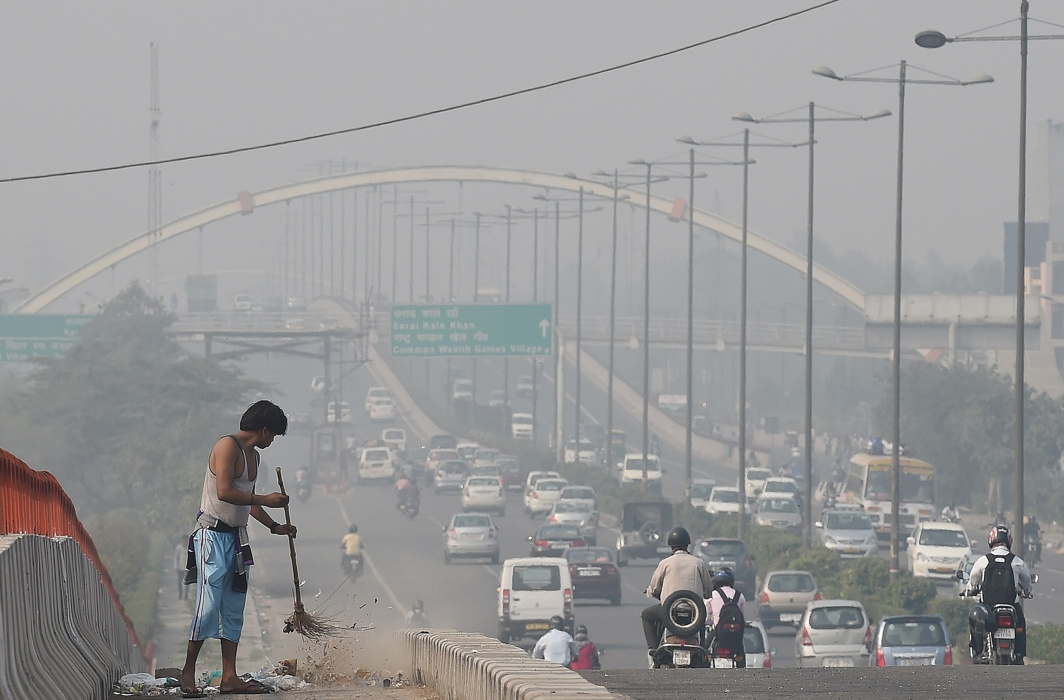[vc_row][vc_column][vc_column_text]Delhi woke up to a hazy Friday after Diwali celebrations with the air pollution in “severe” category, partly because ban on sale of crackers in National Capital Region (NCR) failed to fully prevent fireworks.
The Supreme Court had on October 9 had affirmed a ban it had imposed on the sale of firecrackers in the Delhi-NCR, which consists of 23 districts in three states that border Delhi—14 in Haryana, seven in Uttar Pradesh and two in Rajasthan. The court had said the ban would be lifted at the end of this month, to see if there is any positive effect during Diwali.
The ban on sale of crackers did not prevent Delhiites from bursting them. Initially, Diwali got off to a much quieter start with much lesser noise and smoke till about 6 pm, compared to the previous years. But as the festivities picked up, the faint echo of crackers started growing louder and the pollution indexes sharply rose from 7 pm.
The air quality in Delhi and around was better, but only slightly, than last year’s. The Central Pollution Control Board (CPCB) was reported to have said that the pollution levels in Delhi were slightly lower compared to the air quality recorded during Diwali in 2016. The air quality index (AQI) value yesterday was 319 (Very Poor) while the air quality index last Diwali (October 30) had touched 431 (Severe).
AQI level from 0-50 is considered good, 51-100 is satisfactory, 101-200 is moderate, 201-300 is poor, 301-400 is very poor, and 401 and above is severe.
An AQI reading of ‘very poor’ essentially means that people may suffer from respiratory illnesses on a prolonged exposure to such air.
‘Severe’ category air pollution means that even healthy people will experience reduced endurance in activities and may feel strong irritations and symptoms and may trigger other illnesses. It may seriously impact those with existing respiratory or cardiovascular diseases.
In the NCR which includes Gurugram, Noida and Ghaziabad, an AQI between 400-420 was recorded today morning. Crackers were, however, burst in these regions yesterday, raising question marks on the efficacy of the administration in enforcing the top court’s ban.
A few places of the National Capital Region recorded a steep hike in pollution levels with more than 24 times the average level.
Overall, the AQI was above 400 in most places in Delhi-NCR. The US embassy’s pollution monitor recorded ‘hazardous’ air quality with the index scoring an alarming 878, which the mission considers “beyond its air quality index”, which ends at 500.
The AQI value hit the dangerous 978 mark in RK Puram, Delhi. Media reports said at 11 pm in RK Puram, PM10 read 1179 while PM2.5, the finer particulate matter, was 878 microgram per cubic metre, the highest across all DPCC stations this Diwali. The pollutants had violated the corresponding 24-hour safe limits of 60 and 100 respectively by up to 10 times.
Delhi’s Punjabi Bagh and Anand Vihar area recorded the highest level of pollution with AQI at 999 on Friday morning, which is considered to be hazardous.
The minimum level of pollution, An AQI of 221, was recorded at East Delhi’s Dilshad Garden.
The highest level of AQI, 999 – beyond which no readings are available – was recorded in the capital’s Punjabi Bagh and Anand Vihar areas.
The SAFAR (System of Air Quality and Weather Forecasting And Research), a government agency under the Earth Science ministry, estimated the 24-hour rolling average of PM2.5 and PM10 at 154 and 256 micrograms per cubic metre at around 11 pm, PTI reported.
Measures under Graded Response Action Plan (GRAP) of the Supreme Court-appointed Environment Pollution Prevention and Control Authority (EPCA) for the ‘very poor’ and ‘severe’ categories, which include a ban on diesel generator sets, came into effect on October 17 and they will remain in force till March 15.
Going by SAFAR’s forecast, the post-Diwali air will not be as poor as last year, when it was the worst in three decades. It said a host of favourable conditions were helping prevent the entry of smoke-filled air from the agricultural belt of Haryana and Punjab, where farmers burn crop stubble.[/vc_column_text][/vc_column][/vc_row]























